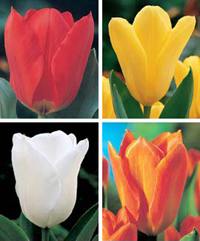| Official internet-portal of St. Petersburg, cultural capital of Russia | |
| Petersburg CITY / Guide to St. Petersburg, Russia | http://petersburgcity.com |
|
Printed from: http://petersburgcity.com/news/business/2004/07/02/flowers/ Business news, 02.07.2004 12:24 Dutch Flower Ban Shrinks Market Rosvetnadzor, the federal veterinary and agriculture agency banned the imports earlier this week. It announced Thursday that the ban will remain in place at least until a delegation of Russian botanists conducts checks in the Netherlands.
Rosvetnadzor, the federal veterinary and agriculture agency banned the imports earlier this week. It announced Thursday that the ban will remain in place at least until a delegation of Russian botanists conducts checks in the Netherlands.
Rosvetnadzor imposed the ban on Dutch flower imports to Russia on Monday, after thrips, a parasite that attacks flowers in pots, was discovered in a large Netherlands shipment.
However, not only flowers in pots, but also cut flowers were banned. "Thrips-infested flowers are supplied to Russia on a regular basis, but the latest lot supplied to Krasnodar was the last straw to break the camel's back," said the head of Rosvetnadzor, Sergei Dankvert.
He refused to estimate when the ban can be lifted. "Permissions on flower imports used to be issued by Rosvetnadzor's regional offices, but now such permissions have to be authorized by the central office," he said. "It is impossible to settle the matter without sending Russian specialists to the Netherlands, where they can examine the greenhouses used for growing the products for imports to Russia," Dankvert said.
"The fuss around Dutch flowers had been staged," Vladimir Kuleshov, director of St. Petersburg wholesaler Flora said Tuesday. "In my opinion, someone's provoking the redistribution of shares in the flower market," Kuleshov said. "Holland has the best system of quality control in the world. There is no one to replace Dutch exports in St. Petersburg today", Kuleshov said. About 80 percent of the products supplied by the city's local flower manufacturers - Tsvety, Nevsky and Moskovsky state flower nurseries - are faulty, he said.
Lyudmila Vikhareva, director of Tsvety, told Business News Agency on Thursday that she had demanded public apology from Kuleshov, who placed his comments in a number of the city's media outlets.
"The quality and the assortment of the flowers grown in St. Petersburg nurseries is equal to that of the imported flowers," Vikhareva said.
Tsvety, the only local producer growing large batches of flowers, is not going to raise prices on products, Vikhareva said.
"The products grown locally can't even be called flowers," Roman Kivel, director of Aalsmeer, another St. Petersburg wholesaler, said Thursday.
"We are currently reorienting our business to involve suppliers from other countries, such as Israel, Colombia and Ecuador," Kivel said. But these measures are only temporary as the ban "cannot possibly last long," he said. Without Dutch exports, local producers will only have flowers to last them a couple of days at most, he added.
Transportation costs have gone up already, Kivel said, because flower exports from other countries are heavier and not as efficiently packaged.
St. Petersburg monthly flower sales are valued at $8 million, of which only 10 percent goes to domestic flower manufacturers. The city also serves as an important transit hub, redistributing flowers as far as Vladivostok. Vans with flowers arrive from Finland and the Baltic states. A medium-sized wholesaler unloads three to four vans per day, Rosbalt information agency reported Monday.
It is impossible to control flower imports to Russia, an anonymous source told Rosbalt on Monday. "Importers may pay about $1,000 per pallet to customs officials in "unofficial fees." Considering that every van carries about 28 pallets, it is doubtful that anyone [offered that kind of money] will block flower imports," the source said. "Flowers will simply become registered as green peas or something else when passing through customs," he said.
News source: times.spb.ru
| |
| (c) 2000 PetersburgCity.com E-mail: contact@petersburgcity.com | |